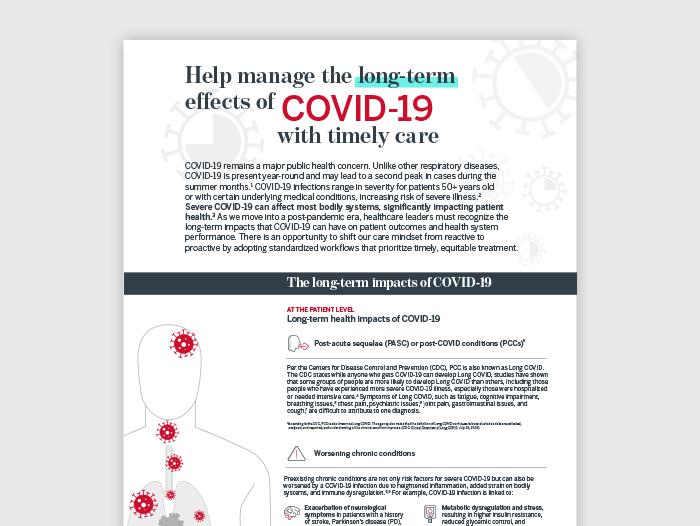Auto logout in seconds.
Continue LogoutAccording to a new study published in Nature Communications, the COVID-19 pandemic may have aged people's brains by several months — even if they never got sick.
Study details and key findings
For the study, researchers first analyzed brain scans from 15,334 healthy adults in the UK Biobank study, which monitors long-term health and biomedical data. The researchers trained machine learning models on hundreds of structural features of the participants' brains to understand how the brain looks at different ages. These models were then used to predict the age of a person's brain.
The researchers then applied the brain-age models to a separate group of 996 healthy UK Biobank participants. These participants all had two brain scans a couple years apart, with 564 having both scans before the pandemic and 432 having their second scan after the pandemic started. The group with both scans before the pandemic was used as the control group.
Overall, the researchers found that the brains of people who had lived through the pandemic had aged an average of 5.5 months faster than those of people in the control group. This accelerated brain aging occurred regardless of whether people had ever contracted COVID-19.
"Brain health is shaped not only by illness, but our everyday environment," said Ali-Reza Mohammadi-Nejad, a neuroimaging researcher at the University of Nottingham and the study's lead author.
According to the researchers, pandemic-related brain aging was the most pronounced in men, older adults, and those who were experiencing hardship, including unemployment, low income, and poor health. People who had less stable employment had an average of five months of additional brain aging compared to those with more stable employment. Those in poorer health also had four additional months of brain aging compared to those in better health.
In addition to looking at participants' brain age, the researchers also examined cognitive tests that were performed during participants' brain scans. The researchers found that only those who had contracted COVID-19 between their brain scans showed signs of cognitive decline, such as reduced processing speed and mental flexibility — a finding that suggests physical brain aging may not have been severe enough to impact mental acuity during the pandemic.
"Some changes do not trigger symptoms, and some others take many years for any symptom to be manifested," Mohammadi-Nejad said.
Advisory Board's COVID-19 RELATED resources
- Radio Advisory episode: What surprised us most about COVID-19
- Even mild cases of COVID-19 can cause changes in the brain, study finds
- Beyond Covid-19: What Stop the Spread can teach us about all health challenges
- Your top resources for Covid-19 readiness
- Case study: Recovery clinics for COVID-19 long-haulers
Commentary
According to Mohammadi-Nejad, the study wasn't designed to discover specific causes of pandemic-related brain aging, but environmental factors and the overall pandemic experience likely contributed to the changes.
"[I]t is likely that the cumulative experience of the pandemic—including psychological stress, social isolation, disruptions in daily life, reduced activity and wellness—contributed to the observed changes," Mohammadi-Nejad said. "In this sense, the pandemic period itself appears to have left a mark on our brains, even in the absence of infection."
Separately, Jacqueline Becker, a clinical neuropsychologist and assistant professor of medicine at the Icahn School of Medicine at Mount Sinai, said that "[t]he most intriguing finding in this study is that only those who were infected with SARS-CoV-2 showed any cognitive deficits, despite structural aging."
"This speaks a little to the effects of the virus," Becker said, adding that these findings may eventually help explain different conditions associated with COVID-19 like long COVID and chronic fatigue.
Adam Brickman, a professor of neuropsychology at Columbia University Vagelos College of Physicians and Surgeons, said that while the study's findings are compelling, they are "still a hypothesis." So far, it's not clear whether accelerated brain aging in people who didn't get COVID-19 will persist over time.
However, if the pandemic did change people's brains in meaningful ways, there could be ways to counter these changes. "We know that exercise is good for the brain and keeping blood pressure at a healthy level, for example," Brickman said. "We know that sleep and social interactions are important."
(Carroll, NBC News, 7/22; Conroy, Nature/Scientific American, 7/23; Pickover, Independent, 7/23; Park, Time, 7/22; Mohammadi-Nejad, et al., Nature Communications, 7/22)
Don't miss out on the latest Advisory Board insights
Create your free account to access 1 resource, including the latest research and webinars.
Want access without creating an account?
You have 1 free members-only resource remaining this month.
1 free members-only resources remaining
1 free members-only resources remaining
You've reached your limit of free insights
Become a member to access all of Advisory Board's resources, events, and experts
Never miss out on the latest innovative health care content tailored to you.
Benefits include:
You've reached your limit of free insights
Become a member to access all of Advisory Board's resources, events, and experts
Never miss out on the latest innovative health care content tailored to you.
Benefits include:
This content is available through your Curated Research partnership with Advisory Board. Click on ‘view this resource’ to read the full piece
Email ask@advisory.com to learn more
Click on ‘Become a Member’ to learn about the benefits of a Full-Access partnership with Advisory Board
Never miss out on the latest innovative health care content tailored to you.
Benefits Include:
This is for members only. Learn more.
Click on ‘Become a Member’ to learn about the benefits of a Full-Access partnership with Advisory Board
Never miss out on the latest innovative health care content tailored to you.


